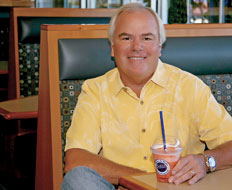They say the only thing you can count on is change. That adage is especially true in the quick-service C-suite, where new career opportunities can leave a company without its top executive at any time.
This year has already witnessed a slew of CEO shake-ups, perhaps none as significant as when Jim Skinner retired and turned McDonald’s over to the capable hands of Don Thompson. Such moves often force even the most seasoned executives to reconsider how succession is handled within their own organizations.
Craig Culver, CEO and cofounder of Prairie du Sac, Wisconsin–based Culver Franchising System, doesn’t plan on letting go of his company’s reins any time soon. But he says his team put together a thoughtful succession strategy long ago. It started when Culver’s father, George Culver, decided to retire and divided his half of the business among his three children.
“That was Dad’s legacy to the children, to gift his 50 percent away,” says Culver, who now helms the company while his brother and sister remain stockholders. The siblings plan to follow their father’s lead by gifting their stock to their own children.
Members of the youngest generation of the family are invited to participate in the company’s quarterly board meetings as observers so they can learn as much about the business as possible, even though they may not be active in day-to-day operations.
“Some day they are going to be active board members in Culver’s,” Culver says.
When Joe Bisogno decided it was time to focus more attention on his myriad entrepreneurial endeavors and leave his post as CEO of the DeSoto, Kansas–based Mr. Goodcents sandwich concept, his personal choice to replace him was franchisee Dave Goebel.
Goebel was chosen not just because he had shown his CEO chops before as the head of Applebee’s, but also because his time as a Mr. Goodcents franchisee had given him a keen understanding of the organization.
“I had a significant opportunity to know the business from the inside out,” Goebel explains. His interactions with other franchisees provided him with insight from people who “grew up with the system,” a perspective he says has proved to be valuable (and helped him as he spearheaded rebranding the concept as Goodcents Deli Fresh Subs).
Those responsible for identifying potential CEO successors—either the chief executives themselves or the company’s board of directors—face the decision of looking within their organizations or recruiting outsiders.
Alice Elliot, CEO of strategic consulting firm The Elliot Group in Tarrytown, New York, says it’s a decision most businesses don’t take lightly.
“Companies today are much more sensitive to making sure they have the right leadership in anticipation of change,” she says. Business leaders often balance the familiarity and comfort of a potential successor who has come up through the ranks against the skills an external candidate might possess, she says.
Elliot cites the need for a more global perspective on business as an attractive skill for potential outside successors. “A lot of companies now are thinking that their growth will be international, and maybe that’s a skill set that wasn’t as prominent internally,” she says.
Succession planning may not always follow a strict process.
Goebel says it can start rather informally and gradually take on more of a formal tone.
“It forces you to look inside the organization at raw talent and say, ‘What can I be doing to groom that raw talent, regardless of how far they’ll make it in the organization?’” he says. It’s a practice he still encourages today; even though he’s only been at Goodcents since 2008, Goebel says he already has his eye on a couple of people inside the organization as potential future leaders.
Grooming internal leaders is also important at Culver’s, even with the company being family owned. If the next family generation decides the CEO role isn’t for them, Culver says, that’s OK; he feels the Culver’s team has a couple of people internally “that could step into my role right now” and carry on with the vision and the leadership style that has built the brand.
Because he’s comfortable with his organization’s ability to continue forward, Culver is giving his own kids latitude to decide if they want to make Culver’s their career. “I am very confident that if I was no longer the CEO, we would have no issues selecting the next CEO of our company,” Culver says.
Industry watchers know McDonald’s values a strong internal succession plan, too. In a statement prior to his retirement, Skinner said the CEO role was one that Thompson, a 22-year veteran of the organization, was well prepared for.
The strategy doesn’t surprise Culver. “You don’t see McDonald’s bringing in a CEO from outside the company,” he says. “They groom their people over the years, and I believe they are outstanding at transitioning from one leader to the next.” Those leaders, Culver points out, have generally been around the organization for several years, learning the inner workings and understanding the brand’s personality. He believes that, even though an outside person may make a good CEO, there’s a cultural aspect to running a company that is tremendously important.
But grooming a successor doesn’t happen overnight, and Goebel says CEOs should be ready to invest time and energy into the organization’s next round of leadership. “A CEO, more than anyone else, is going to understand all the pieces of the job and the challenges,” he says. “I think a large chunk of that succession plan falls right on the shoulders of the CEO to be mentoring future talent and eventually their successor.”
Elliot says good succession strategies are “very thoughtful,” often starting several years before a transition is expected and giving potential successors the chance to gain experience in as many aspects of the company’s operations as possible.
“It becomes an opportunity to make sure they’ve gotten the right cross-training throughout the organization, which means exposure to different skill sets regardless of their original talent,” she says. She adds that external schooling, such as attending business management programs, is also a common way to make successors “a bit more well rounded and seasoned.”













